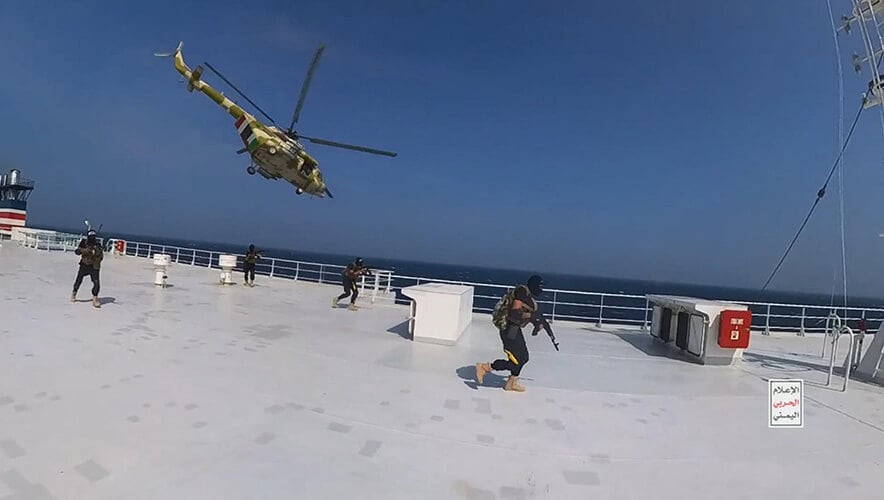Houthis from Yemen Seize Ship in Red Sea in Sign of Broadening Mideast Hostility
On 19 November, Houthi rebels from Yemen seized a cargo ship in the Red Sea and diverted it to the port of Hodeidah, Yemen. The action follows through on the rebels’ threat last week to attack Israeli vessels in response to Israel’s actions in Gaza.
The ship’s name is the Galaxy Leader, and its ties to Israel are loose. The ship is a roll-on, roll-off (RoRo) vessel that had unloaded its cargo of hundreds of automobiles in Turkey and was on route to India. As is typical with maritime shipping, its provenance is complex: It sails under the flag of the Bahamas; its crew is composed of nationals from Bulgaria, Ukraine, the Philippines, Mexico, and Romania; it is owned by a company registered in the British dependency the Isle of Man; it is operated by RoRo company Ray Car Carriers; and at the time of the Houthi attack it was being leased to a Japanese company.
The Israeli link to the Galaxy Leader? That comes in at the Ray Car Carriers portion of that list, which is owned by Israeli shipping and construction magnate Abraham “Rami” Ungar.
Houthi rebels recorded their attack on video, which included a helicopter overtaking the vessel and militants rappelling from the aircraft and taking control of the vessel. The Washington Post reported the ship and crew of 25 are hostages of the attackers. The rebels announced that all Israeli commercial vessels are legitimate targets until Israel ceases its military campaign in Gaza.
The International Maritime Security Construct, a coalition of governments dedicated to security and freedom of maritime navigation in the Middle East, issued a warning last week about the potential for attacks.
“We continue to be concerned with a heightened threat level in the Red Sea,” the alert said. “The approaches to the Bab al Mandeb continue to be an area of concern. When choosing routes, orient toward creating maximum feasible distance from Yemeni waters.” (Emphasis in the original.)
“The strait between Yemen on the Arabian Peninsula, and the area known as the Horn of Africa where Djibouti and Eritrea are located, is a vital shipping lane,” reported Maritime Executive. “Oil tankers departing the Middle East as well as numerous containerships sailing the routes between Asia and Europe pass through the area. The strait is the link between the Indian Ocean, the Suez Canal, and the Mediterranean.”
Several governments, including the United States, criticized the attack.
The Houthis are a Shiite minority in Yemen with ties to Iran and Hezbollah, and they have taken control of large portions of Yemen from the Sunni majority, which has support from Saudi Arabia, in the country’s ongoing civil war. While the Yemeni conflict had grown cooler, the situation remains part of the complicated calculus of the volatile region. Since Hamas attacked Israel and Israel responded by declaring war and began actions in Gaza, the Houthis have fired cruise and ballistic missiles and sent drones from the south toward Israel. These attacks failed because Israeli air defenses and U.S. Naval ships intercepted the missiles.
The situation is also tense north of Israel, along the West Bank into Lebanon, where Hezbollah and Israel have exchanged rocket fire. “Almost always, the strikes are within 4 to 5 miles of the border on either side, a deliberate calibration designed to contain the violence and avert a far more devastating war,” The Washington Post reported. “But the range and intensity of the fighting is gradually increasing.”











